Welcome to Trail Guide, your host through the wilds of the 2016 presidential campaign. It’s Wednesday, Feb. 3, and here’s what we’re talking about:
- Democrats sanction additional debates between Bernie Sanders and Hillary Clinton that will span into May
- Rand Paul drops out of GOP presidential race
- Rick Santorum, who won Iowa in 2012, also exits presidential race
- Sanders shored up enough support to now use in New Hampshire
- Sanders and Clinton are set to appear in a New Hampshire town hall tonight
- Can Marco Rubio make his moment in the sun continue?
- Share via
Clinton talks about big-money speeches
- Share via
Hillary Clinton faces pointed questions in Democratic town hall
Beyond the tit-for-tat with Bernie Sanders over ideology, the CNN town hall reflected again the extent to which Democratic and independent voters still have their doubts about Hillary Clinton, despite – or perhaps because of – her decades in the public eye.
The questions to her from New Hampshire voters were more pointed than those Sanders faced, including whether she would rule out future military interventions abroad – she would not - and how she could withstand the attacks to come from Republicans.
Clinton said she has learned to take criticism from Republicans “seriously but not personally,” and would continue to work to maintain voters’ trust.
“I know that I have to really demonstrate as clearly as I can who I am, what I stand for, what I’ve always done,” she said. “I’ve always been guided by the same values, I’ve always listened to people, and I’ve always worked as hard as I could to produce results for people.”
- Share via
Hillary Clinton hesitates to answer whether women should register for military draft
Hillary Clinton said she wasn’t ready to answer a question about whether women should be required to register for a military draft as their roles continue to expand in the armed services.
Army Chief of Staff Gen. Mark Milley said this week that women should register for the draft. Young men in the U.S. must currently register, even though there is no draft.
“I have to think about whether it’s necessary to go as far as our military officers are recommending,” said Clinton at Wednesday’s Democratic town hall in Derry, N.H.
Clinton said the all-volunteer military was working.
Moreover, she said she had a “hard time” seeing any kind of national emergency in which a draft would be necessary.
“I have to be better informed about why they’re making this recommendation,” she concluded.
- Share via
Clinton describes ‘litmus tests’ for Supreme Court choices
“I do have a litmus test” for Supreme Court appointments, Hillary Clinton said during a town hall in New Hampshire, setting out several.
The current conservative majority on the court has “given way too much power to corporations,” she said, denouncing the Citizens United decision that has led to unrestricted donations by corporations and wealthy individuals to candidates.
Clinton also rejected a recent high court decision that essentially ended a significant part of the Voting Rights Act.
“We have to preserve marriage equality,” Clinton said. And, she added, the court needs to protect the Roe v. Wade decision, which legalized abortion, and “not let it be nibbled away or repealed.”
“I’m looking for people who are rooted in the real world, who know that part of the genius of our system” is to keep any part of society, such as business, from having too much power.
- Share via
Trump, watching Democratic town hall, responds to Sanders
- Share via
Bernie Sanders: ‘Thank God I’m in good health’
He has a clean bill of health, but Bernie Sanders’ age came up early in Wednesday’s New Hampshire town hall.
The question came from an audience member: If elected, would Sanders, 74, run again in 2020?
“Thank God I’m in good health,” the senator from Vermont replied. “If I am fortunate enough to win the general election and we do well, yes, I would like to run for reelection.”
Last month, as questions surfaced about his age, Sanders released some of his medical records, which showed he was in overall good health.
- Share via
Sanders gets rare question on faith
Speaking in a televised town hall in New Hampshire, Sen. Bernie Sanders got a question on a subject he doesn’t often talk about publicly -- religious faith.
Sanders is Jewish, but has said he has little involvement with organized religion. Asked by CNN anchor Anderson Cooper, the moderator of the town hall, whether faith plays a major role in his life, Sanders said it did.
Faith “is a guiding principle in my life,” he said. “I would not be here tonight” running for president “if I did not have very strong religious and spiritual feelings.”
Continuing to describe his faith, Sanders steered clear of traditional theological issues and focused, instead, on social justice.
“My spirituality is that we are all in this together. When children are hungry, when veterans sleep out in the street, it affects me,” he said.
- Share via
Jeb Bush to Marco Rubio: Got a problem with negative ads? Get over it!
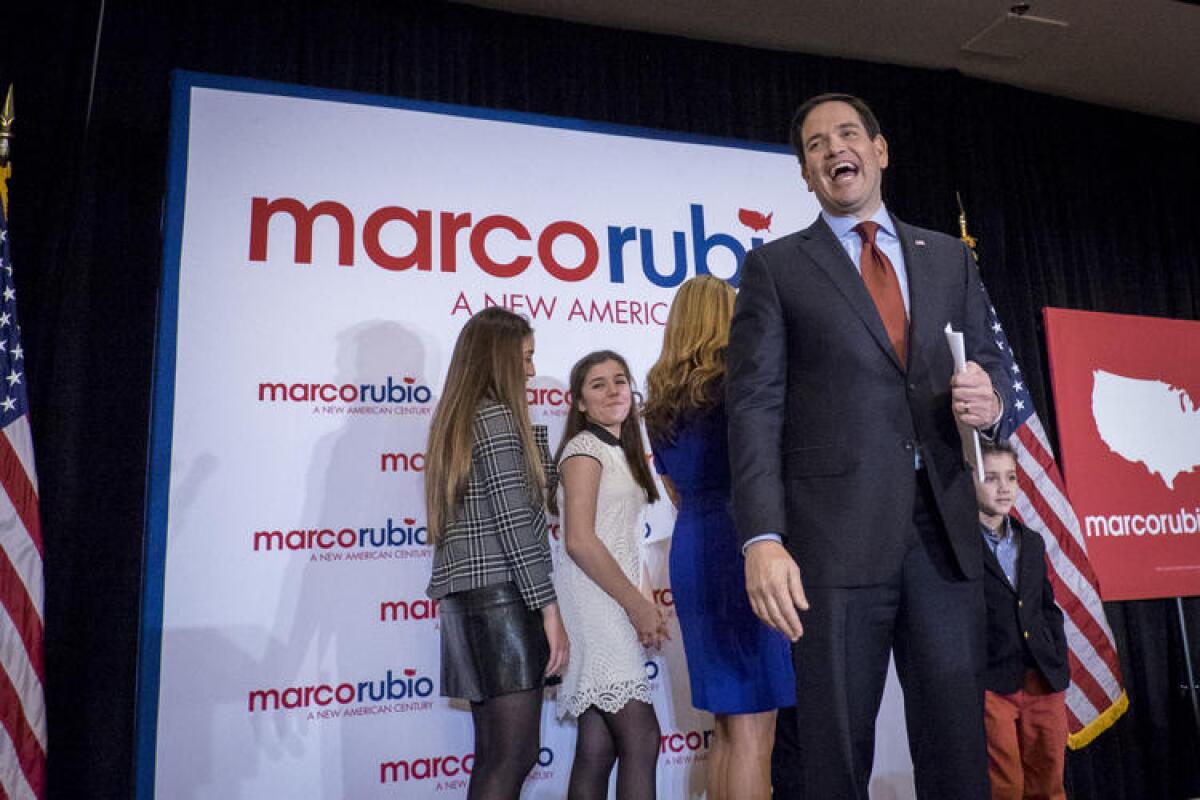
Jeb Bush and Marco Rubio used to be close, both personally and politically. As Florida governor, Bush mentored Rubio as he climbed the political rungs from local office to the statehouse to the United States Senate.
But their relationship has disintegrated in the heat of the 2016 campaign, a victim of their colliding ambitions.
Now Bush routinely assails Rubio, and a political action committee -- independent but working on Bush’s behalf -- has spent millions of dollars on advertisements blistering the freshman Florida lawmaker over issues such as his immigration stance and his personal finances.
The onslaught has upset and angered many Republicans who fear the damage it could do to the candidate emerging as the favorite of the embattled GOP establishment.
A woman attending a Bush town hall meeting Wednesday night in Laconia didn’t put it quite that way. She just said she was sick of being inundated with attack mailers.
She called Bush a gentleman and asked if he would care to denounce the negativity?
No, he replied, he would not.
“Guess what? This is not bean bag,” Bush said. “It’s a contact sport.
“If you think it’s ugly right now, which ... I think it’s pretty tame compared to the previous elections, wait ‘til you get to the general election,” he said. “Wait ‘til Hillary Clinton gets up to bat. That’s the hit machine you should be focused on.”
Bush suggested anyone put off by the negativity should just filter it out. (It hasn’t been all one way, Bush said. Rubio’s political action committee has been attacking him.) His advice to Rubio was more succinct and faintly condescending. “Get over it, man. This is politics.”
- Share via
In Arkansas, Trump assails Cruz’s Iowa win as “fraud”
As his rivals for the Republican presidential nomination traversed New Hampshire on Wednesday, Donald Trump headed South and accused Ted Cruz, who won the Iowa caucus, of voter fraud.
“You know voter fraud, these politicians are brutal. They are brutal. They are brutal. They are a bunch of dishonest cookies I tell you,” Trump said to supporters packed into an arena in Little Rock, Ark.
Trump came in second in Iowa. He castigated Texas Sen. Cruz over a controversial campaign mailer sent out in the days ahead of the caucuses.
The campaign literature had the label “Voter Violation” in bold red letters, with the words “official public record” across the top and urged caucus-goers to turn out. Iowa election officials had called the mailer misleading.
“That’s like a fraud,” Trump said.
Trump sent out a barrage of tweets Wednesday attacking Cruz. Based on an average of several polls, the billionaire developer is leading by double-digits in New Hampshire, where voters will cast ballots Feb. 9.
Cruz dismissed Trump as having nothing more than a so-called “Trumpertanrum,” and said he’s focused on building on his momentum and winning New Hampshire.
Trump’s decision to not campaign in New Hampshire on Wednesday raised eyebrows among some political analysts, who see his lead in the state possibly slipping.
For Trump, southern state’s like Arkansas, are key to his strategy for winning the nomination as voters there will cast ballots in the March 1 SEC primary and he sounded optimistic on Wednesday.
“My focus is on New Hampshire, we’re doing great up there,” he said. “ The people in New Hampshire are great, the people in Arkansas are great.”
- Share via
Marco Rubio sees Obama’s mosque visit as ‘pitting people against each other’
On his first visit to a mosque as president on Wednesday, President Obama declared that no matter what race, creed or religion, “We’re one American family.”
“At a time when others are trying to divide us along lines of religion or sect, we have to reaffirm that most fundamental of truths: We are all God’s children. We’re all born equal, with inherent dignity,” Obama said at the Islamic Society of Baltimore.
On the campaign trail in New Hampshire, Florida Sen. Marco Rubio instead heard something he said Obama has done all too often, “pitting people against each other.”
“Look at today. He gave a speech at a mosque, basically implying that America is discriminating against Muslims,” Rubio said to a capacity crowd at an Irish pub in Dover. “Of course there’s discrimination in America, of every kind. But the bigger issue is radical Islam.”
“This constant pitting people against each other, I can’t stand that,” he continued. “It’s hurting our country badly.”
Rubio said he would govern as a conservative but would always look for ways to seek bipartisan agreement. And he offered an example from his Senate service.
“I passed a law two years ago that gave the [Veterans Affairs] secretary the power to fire the senior executives at the VA that were not doing a good job,” he said. “You know who worked with me to pass that? Bernie Sanders.”
“Now we don’t agree on virtually anything else, but at least we agreed that if you’re not doing a good job, they should be able to fire.”
- Share via
Kasich sees the glass as half full on American problems
Republican presidential candidates sometimes appear to be competing to paint the most dire picture of American security, portraying a world where Islamic terrorists are on the march as the Obama administration lets the military wither.
John Kasich, the Ohio governor who is hoping a strong showing in next week’s New Hampshire primary gives his White House bid a much-needed boost, had a different view on Wednesday.
“I don’t believe the country’s sitting on the edge of a cliff. I think things are pretty good in America,” Kasich said during a business forum in a Manchester, N.H., office building.
“We have problems. But they’re all solvable,” he added.
The governor made the comments in response to an audience member who questioned whether more defense spending was necessary in light of the country’s deficit and its already unmatched military strength.
Kasich has pledged to carefully scrutinize Pentagon spending even as he’s proposed a $100-billion increase in the defense budget.
“We always have to have a qualitative advantage,” he said. “We’re the leader of the world.”
- Share via
Another GOP senator goes for Rubio
- Share via
If or when — the candidates can’t agree
Political speeches can seem fresh for only so long. After a while, the mind turns to the candidates’ quirks.
Here in New Hampshire, Texas Sen. Ted Cruz and Florida Sen. Marco Rubio are engaged in a fierce fight to become the chief opponent to businessman Donald Trump — or, if Trump’s campaign further falters, to take over the number one slot.
Their appeals are quite similar. Cruz, a college debater, tends to tick off the things he would do in order of their placement in the U.S. Constitution. (First, religious freedom, then guns, and so on.)
Rubio speaks conversationally, if with far more vehemence and aggressiveness than a typical conversation would entail.
They both vow to repeal President Obama’s healthcare plan immediately, build a wall along the Mexican border and save the next generation of children from becoming the first generation of children not to be better off than their parents.
(That last one is a revered political line, which Bill Clinton employed in every speech he made during his successful run in 1992. And he may well have swiped it from someone else.)
But there is one distinct difference between the two senators: the word employed at the beginning of the sentences in which they make their promises.
“If I am elected president, every criminal illegal alien will be deported,” Cruz thundered Wednesday during an appearance in Henniker.
No ifs for Rubio.
“When I’m president, we’re banning ‘Marco Polo,’” he said Tuesday night in Exeter, laughing at the torment the childhood game caused him.
More seriously, “When I am president, we are not hiring 20,000 new IRS agents; we’ll hire 20,000 new border agents instead.”
For Rubio, who looks younger than his 44 years, the usage may serve as a way to cast his success as inevitable in the minds of any skeptical voters. He does argue insistently that he would be the candidate best equipped to defeat the Democratic nominee.
But it can also come off as a bit presumptuous. Cruz’s language — if — conjures the air of possibility, if only voters will see the light. Which is, of course, what every candidate hopes.
- Share via
Ben Carson suggests Ted Cruz is a hypocrite, but won’t quite say it
Ben Carson summoned reporters to a news conference Wednesday afternoon with an announcement citing Jesus’ Sermon on the Mount and the admonition to judge others “by their fruit, not just the words they say.”
The rare biblical reference in his news release seemed aimed at Texas Sen. Ted Cruz, whose supporters spread a rumor during Monday night’s Iowa caucuses that Carson had dropped out. Cruz has been trying to win over evangelical voters, many of whom support Carson, a retired neurosurgeon.
But when asked directly if he was referring to Cruz, or calling him a hypocrite, Carson backed off.
“I didn’t say a word about Ted Cruz,” he told reporters after his opening remarks that repeated the biblical verse.
Wasn’t that the point of the news conference?
“It’s clear that there were people who tried to take advantage of a situation,” Carson said. “Sen. Cruz told me that he was not aware of that when I talked with him…We’ll wait and see what he does to demonstrate that.”
It was all very cryptic, another sign of Carson’s unorthodox campaign. The comments that sparked the rumor Monday were nearly as odd. Carson’s campaign staff had informed the press that he was returning home to Florida to get a fresh set of clothes, rather than moving onto New Hampshire for the next electoral contest.
“Is it OK after being on the road for almost three weeks to go home and get a fresh change of clothes?” Carson said Wednesday, by way of explanation.
“Does that make somebody into a evil, horrible person?”
Carson said he believed the rumor cost him support. He finished with 9% of the vote. Cruz has apologized, both privately to Carson and in public.
“He said, obviously, he didn’t know that people were doing this sort of thing in his organization and he didn’t agree with it,” Carson said.
Carson wanted more, suggesting — without quite saying it — that Cruz should fire staff members, pointing out that he parted ways with people in his own operation after financial questions arose about his campaign.
“I made changes and I think that’s what a good leader does,” Carson said. “If he agrees with it, he doesn’t need to make changes.”
The imbroglio has widened beyond Carson.
In a string of tweets Wednesday, Donald Trump, who was disappointed with his second-place finish, accused Cruz of “fraud” and called for a new vote in Iowa.
Cruz fired back by coining a new word: “Trumpertantrum.”
- Share via
Cruz-Trump fight heats up again
- Share via
Democrats sanction additional debates that will span into May
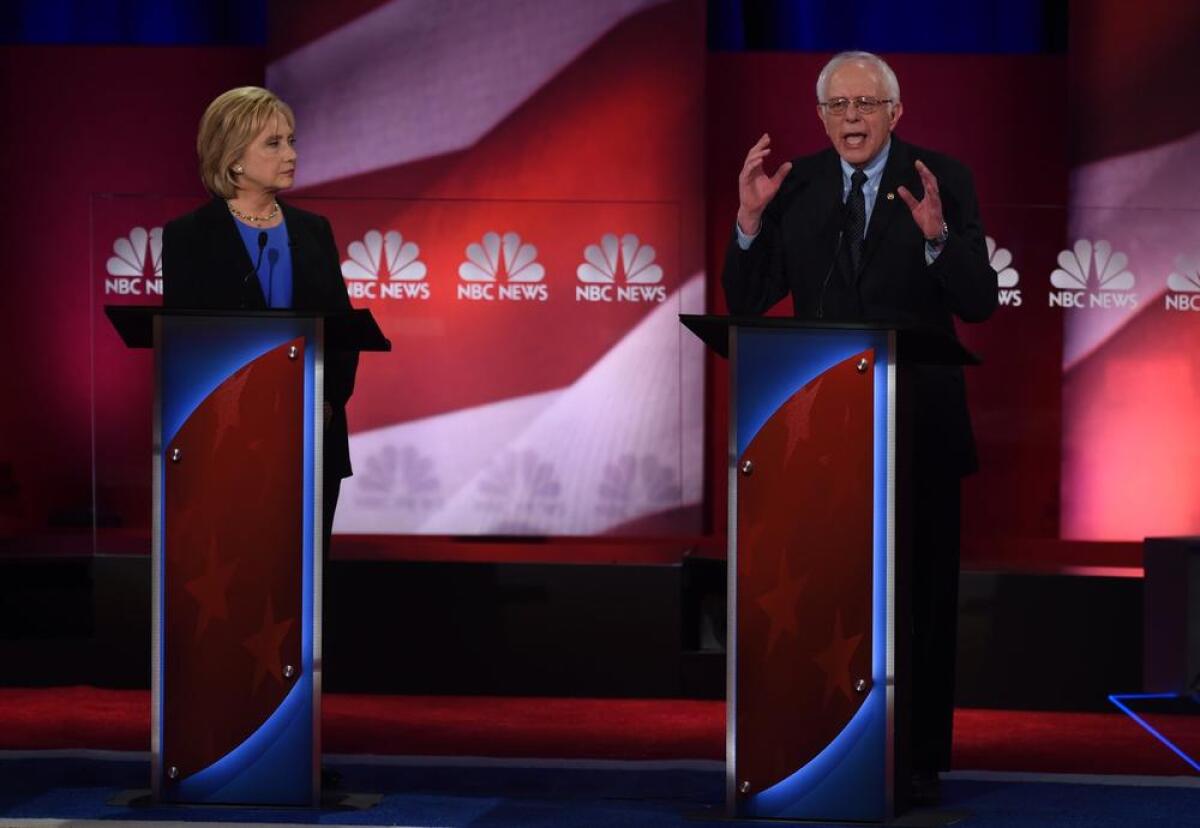
Negotiations over adding new debates to the Democratic primary calendar, including one possibly in California, were completed on Wednesday as the party prepares for a nominating contest that could span well into the spring.
In a statement, DNC Chairwoman Debbie Wasserman Schultz said three additional debates will be sanctioned by the party.
“The first of these new debates is confirmed to take place in Flint, Mich., on March 6, with the remaining two taking place in April and May, with times and locations to be determined,” Schultz said.
The DNC also sanctioned a debate Thursday in New Hampshire, which will be hosted by MSNBC.
Talks between Bernie Sanders’ campaign and Hillary Clinton’s side have been focused on adding four debates to the schedule. Sanders agreed several days ago to a plan to sanction the New Hampshire debate if Clinton would agree to add three more later in the campaign season.
In an interview with CNN on Wednesday, Sanders said the two sides have agreed on locations for two of the three proposed debates — California and Michigan. But, Sanders said, the Clinton campaign has resisted holding an event in New York, the state she once represented in the U.S. Senate.
Sanders and Clinton are both scheduled to appear at a town hall Wednesday that will be hosted by CNN.
UPDATES
1:38 p.m.: This article was updated with a statement from the Democratic National Committee.
This article was originally published at 11:36 a.m.
- Share via
Rick Santorum exits presidential race, endorses Marco Rubio
Former Pennsylvania Sen. Rick Santorum, who won Iowa’s 2012 caucuses, ended his presidential campaign on Wednesday and endorsed Marco Rubio for president.
“It is time to coalesce around the strongest candidate who will stand up for conservative values, be a statesman on the world stage, and has the ability to win a general election,” said Santorum in a statement.
Santorum, whose campaign failed to gain traction and court powerful donors, was a favorite of evangelicals four years ago, but garnered only 1% of the vote on Monday night in Iowa and has long lagged in the polls in other states.
Monday’s results have winnowed the GOP presidential field. Former Arkansas Gov. Mike Huckabee, another previous Iowa winner, withdrew Monday night. Sen. Rand Paul of Kentucky withdrew earlier Wednesday.
On the Democratic side, former Maryland Gov. Martin O’Malley dropped out Monday night.
5:02 p.m. This post was updated with Santorum’s endorsement of Marco Rubio
- Share via
It’s (still) the economy, stupid
Immigration has generated some of the biggest fireworks. What does the media love to cover? Fireworks. This is about economic issues and terrorism.
— David Winston, a Republican pollster, noting that entrance-poll interviews with GOP caucus-goers in Iowa ranked concerns about immigration behind those other issues.
- Share via
Clinton calls Sanders comment ‘low blow’
Escalating her fight with Bernie Sanders in what she referred to as his “backyard,” Hillary Clinton called the Vermont senator’s critique of her progressive credentials a “low blow” and challenged him to line up his record of accomplishment against hers.
In response to media questions Tuesday, Sanders scoffed at the idea that Clinton was calling herself a “progressive,” saying maybe she was so “on a good day.”
Clinton punched back during a town hall meeting here by recalling moments throughout her career, saying it was a “good day for progressives” when the Children’s Health Insurance Program she championed became law, or when she spoke out in China on behalf of women’s rights and later in Switzerland on gay rights.
“There are some good days for progressives when Planned Parenthood and the Human Rights Campaign and unions representing 11 million workers endorsed me, because we’ve been fighting the progressive fight and getting results for people for years,” she said, referring to groups Sanders has derided as “the establishment.”
“So I hope we keep it on the issues,” Clinton continued. “Because if it’s about our records, hey, I’m going to win by a landslide on Tuesday.”
If it’s about our records, hey, I’m going to win by a landslide on Tuesday
— Hillary Clinton
Clinton acknowledged she still faces an uphill climb in New Hampshire, alluding to some pundits who said that because of Sanders’ lead in the polls and “neighborly” advantage, she might have been better off skipping ahead to later states in the process.
“I have to tell you, I just could not ever skip New Hampshire,” she said. “I cannot even imagine not being here. ... So I’m going to be out here making my case, answering your questions, doing everything I can to persuade you to come out and vote next Tuesday.”
Clinton has three public events in the state today before a CNN town hall this evening. Sanders canceled his only public events.
- Share via
Hillary Clinton, Bernie Sanders set to attend New Hampshire town hall
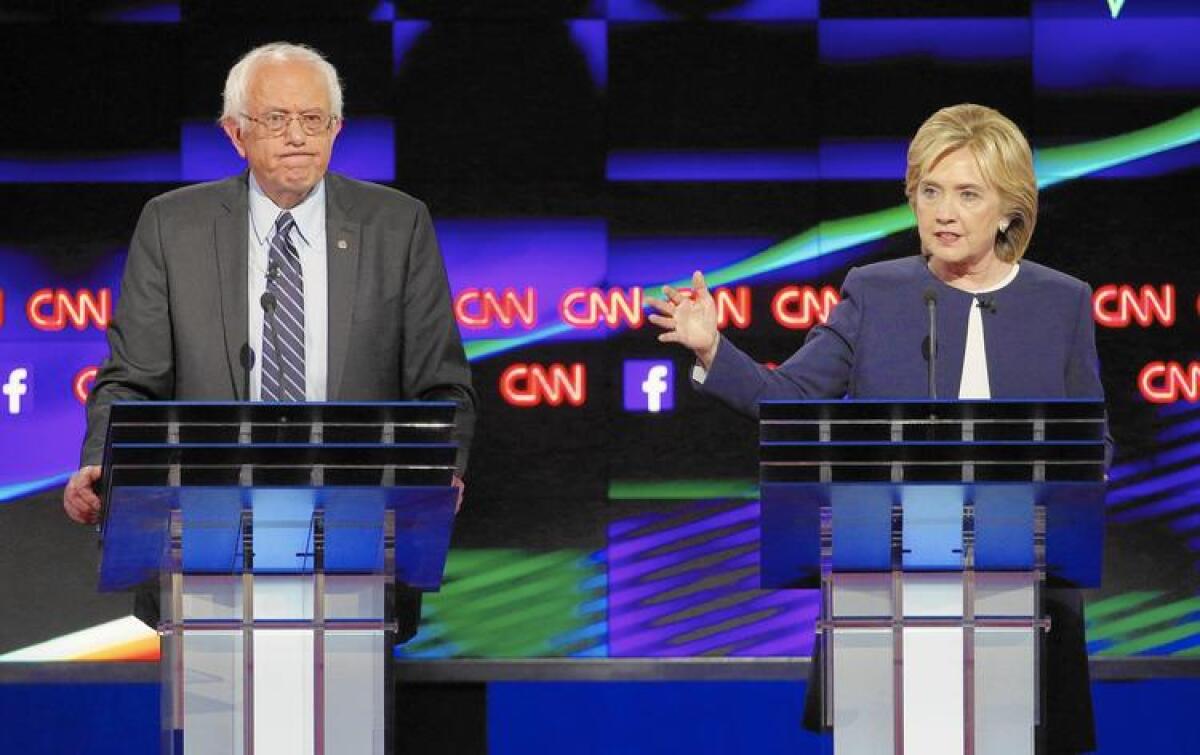
Hillary Clinton and Vermont Sen. Bernie Sanders will meet in New Hampshire on Wednesday night for a Democratic town hall, two days after a razor-sharp finish in Iowa.
The town hall, hosted by CNN and set to air at 6 p.m. Pacific Time, will allow Granite State voters the opportunity to question each candidate ahead of the state’s first-in-the-nation primary on Tuesday.
Clinton and Sanders are the final remaining candidates on the Democratic side. Former Maryland Gov. Martin O’Malley exited the race on Monday after a lackluster performance in the Iowa caucuses.
Following Clinton’s narrow victory in Iowa over Sanders, she enters New Hampshire down by double digits to the Vermont senator, based on an average of several polls.
What: Democratic town hall
Where: New Hampshire
When: 6 p.m. Pacific Time on CNN; follow along here on Trail Guide for updates.
- Share via
Trump accuses Ted Cruz of ‘fraud’ in Iowa win
After initially appearing stunned into silence by his loss in the Iowa caucuses, billionaire Donald Trump resumed his Twitter attacks Wednesday.
In a torrent of tweets, he said Sen. Ted Cruz “stole” the nation’s first presidential nominating contest by circulating false reports Monday night that Ben Carson was dropping out of the race and other alleged misdeeds.
He said he wants a new election.
- Share via
It only hurts when he laughs
Trippi was chief strategist for Howard Dean, the former Vermont governor who was national front-runner for the 2004 Democratic presidential nomination until his campaign crashed and burned in Iowa.
Dean, unlike Donald Trump, actually finished third.
- Share via
Rand Paul exits GOP presidential race after poor Iowa showing
Sen. Rand Paul, whose libertarian message was once seen as a powerful match for voter unrest, is dropping out of the presidential race, his spokesman confirmed today.
Paul built a grass-roots base stemming from the legacy of his father, former Rep. Ron Paul, but failed to gain traction. He languished in the polls and placed far behind GOP front-runners Sen. Ted Cruz of Texas and billionaire Donald Trump in the Iowa caucuses.
The Kentucky lawmaker faces a challenge from Democrats in his Senate reelection bid. He is expected to shift his attention to that race.
Paul was among the first tea party senators elected when he stunned Washington to win his seat in 2010.
- Share via
Cruz campaign apologizes to Carson after an inaccurate tweet
Ted Cruz’s campaign again offered apologies to Ben Carson on Wednesday after a top Cruz supporter erroneously tweeted during Monday’s Iowa caucuses that Carson planned to suspend his campaign. Cruz campaign spokesman Rick Tyler said the tweet, sent by Rep. Steve King of Iowa, Cruz’s campaign co-chairman, was in error and not factual.
Carson accused Cruz of “dirty tricks” amid reports that caucus-goers were told Carson had dropped out.
Tyler said he did question Carson’s plans to rest and relax in Florida instead of immediately campaigning in New Hampshire.
“That’s a significant campaign development, when people say they aren’t going to come to New Hampshire immediately as most of the campaigns have done,” Tyler said on CNN.
King and other Cruz staffers said they incorrectly read a CNN article that suggested Carson’s slow move to New Hampshire showed he would wind down his campaign.
“It may be that some of our caucus precinct campaigns may have heard what was going on in our campaign and went too far,” Tyler said.
Carson responded to King’s tweet on Tuesday with a call for the staffer’s firing. He explained that he wants to take a short break to sleep in his own bed before heading back out.
“Whoever is responsible for blatant lying should be dismissed, absolutely,” he said in an interview with CNN.
But he later accepted the apology issued by the Texas senator. He said as a Christian it’s in his nature to forgive — he can’t control what information other campaigns distort.
- Share via
Donald Trump: ‘I’m a rookie,’ not a politician
Donald Trump continued Wednesday to lament the response to his second-place finish in Iowa’s caucuses. Putting on what he called a more “understated” and “statesman”-like persona, the businessman brushed off the loss to Texas Sen. Ted Cruz and said he performed better than most seasoned politicians.
He said he doesn’t understand why the media and analysts paid more attention to Florida Sen. Marco Rubio’s third-place finish.
“The person that came in third, Marco, they made it sound like he had one of the great victories of all time,” Trump said Wednesday on NBC’s “Today.” “I came in second and they didn’t call it great.”
Several polls leading up to Monday’s caucuses — including one from the Des Moines Register — pegged Trump as the winner for the Republican Party in the first round of votes. Trump, who campaigns heavily on poll results, failed to overcome rival Cruz, though.
Trump blamed the incorrect polling predictions on a difficult caucus system in Iowa, and he added that he’s new to the game of politics.
“The caucus system is a complex system that I was never familiar with,” Trump said Wednesday on MSNBC’s “Morning Joe.” “I’m doing this for the first time. I’m like a rookie.”
But he said the results don’t mean he will give up on polls.
- Share via
How Donald Trump’s loss in Iowa showed his campaign’s weak spots
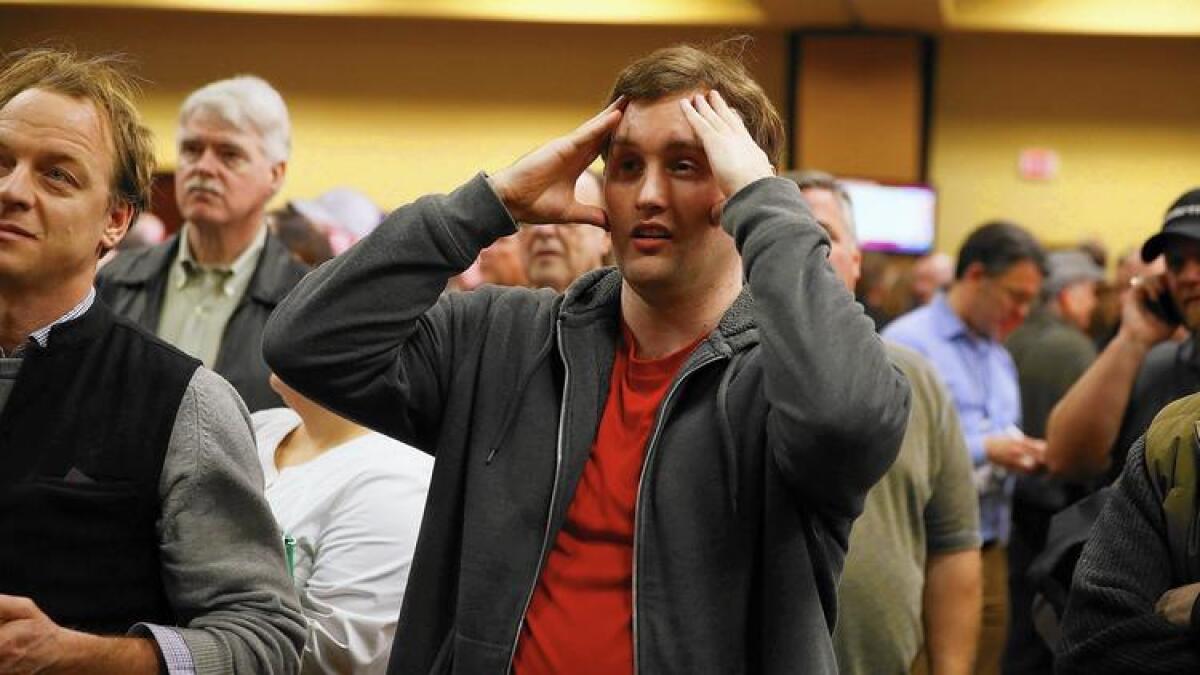
Donald Trump’s second-place finish in Iowa exposed an array of weaknesses in his campaign: His flashiness has started to grate on supporters. He’s proved vulnerable to attacks on his ideological purity. And he failed to put together an effective ground operation.
All this raises questions about the novice candidate’s wherewithal to command the kind of sprawling and complex enterprise required to win the presidency. The skills that enabled Trump to build his business empire are not entirely the same as the ones he needs to win the world’s most powerful job.
- Share via
Marco Rubio basks in the attention of a third-place finish
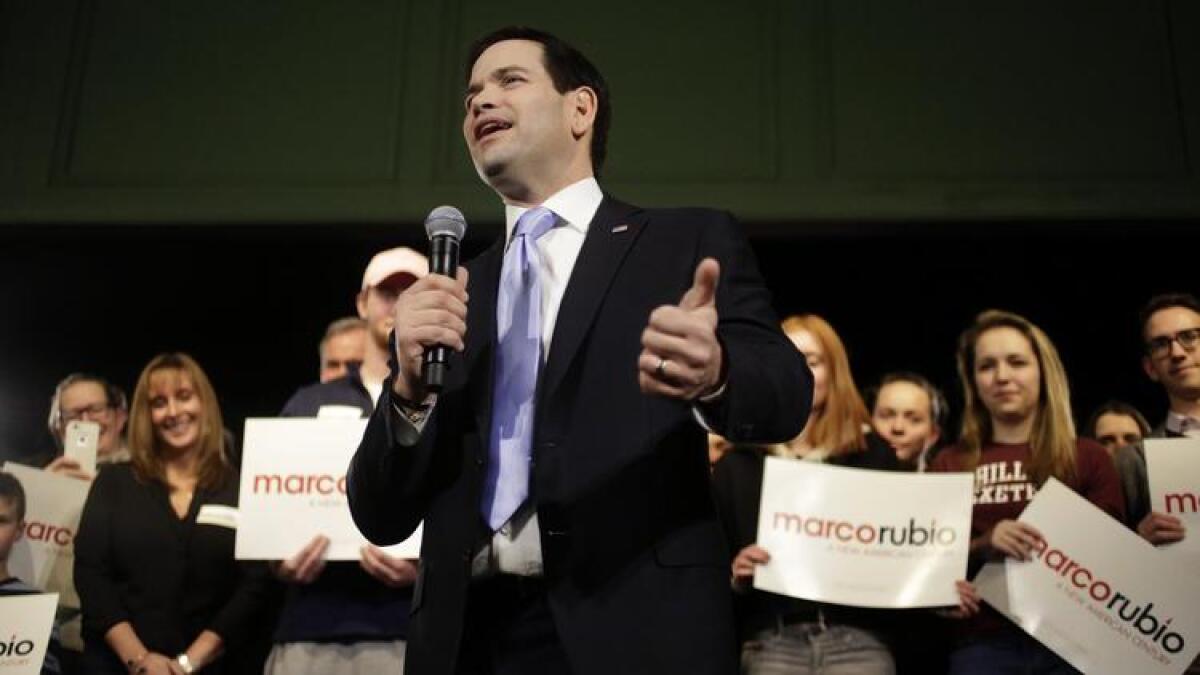
In the nine months in which he has run for president, Marco Rubio’s ambitions have been confounded by contradictions.
He is the self-styled candidate of the future many of whose policy prescriptions draw from the 1950s. He is the candidate of sunny aspirations in a race that has glowered with anger. He was the candidate who wanted immigration reform until he didn’t, angering all sides. He was too young, too impatient, too thirsty, too profligate with other people’s money — and then there were those much-mocked high-heeled boots.
And now? Marco Rubio is the presidential campaign’s newest sensation, the target of laser-like attention Tuesday after his surprising third-place finish in the Iowa caucuses, opening his New Hampshire campaign with the hope that Midwestern momentum will propel him past all those who doubted.
- Share via
Inside the messy Democratic caucus counting in Iowa
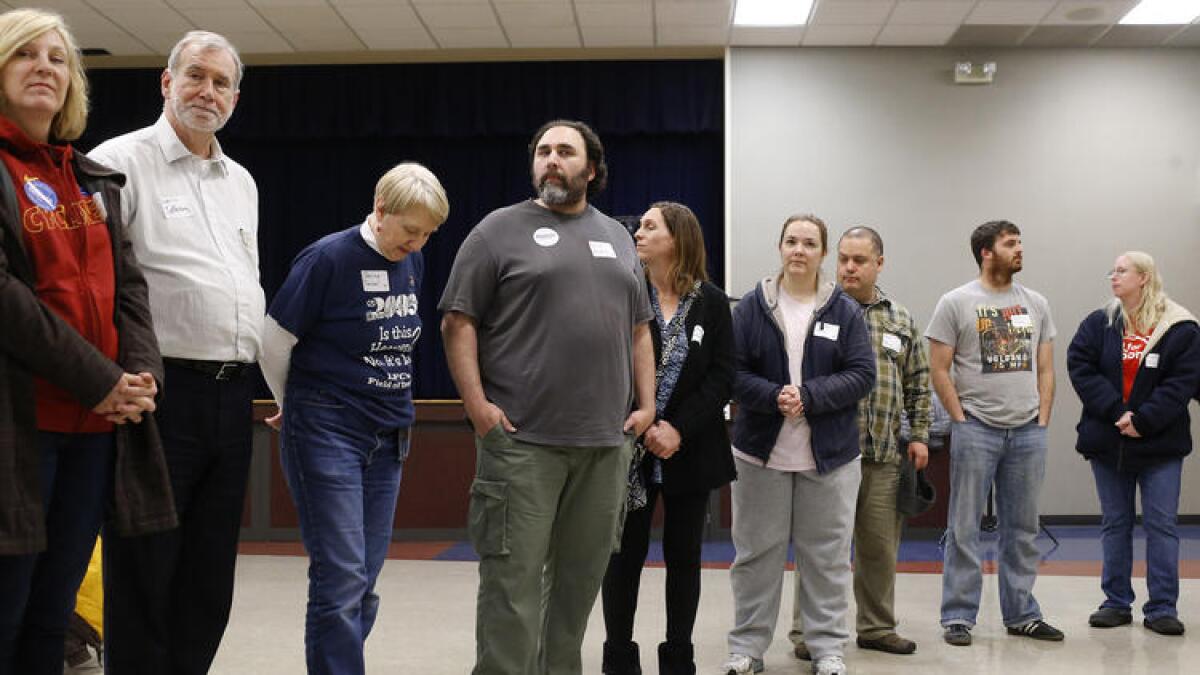
The phone rang at 1 a.m. on Tuesday at the home of Gary Gelner, the Democratic chairman of Iowa’s Hancock County. State party officials wanted the results from two caucus precincts in his rural swatch about 100 miles north of the state capital.
For one location, the state party simply wanted to confirm the outcome; a razor-thin margin separated rivals Hillary Clinton and Bernie Sanders in the first nominating contest of the 2016 presidential election, and a correct count was crucial. But in the second, they had not received any results at all.
Turns out, no one had shown up.
- Share via
Bernie Sanders holds an unusual perch in the Democratic primary right now
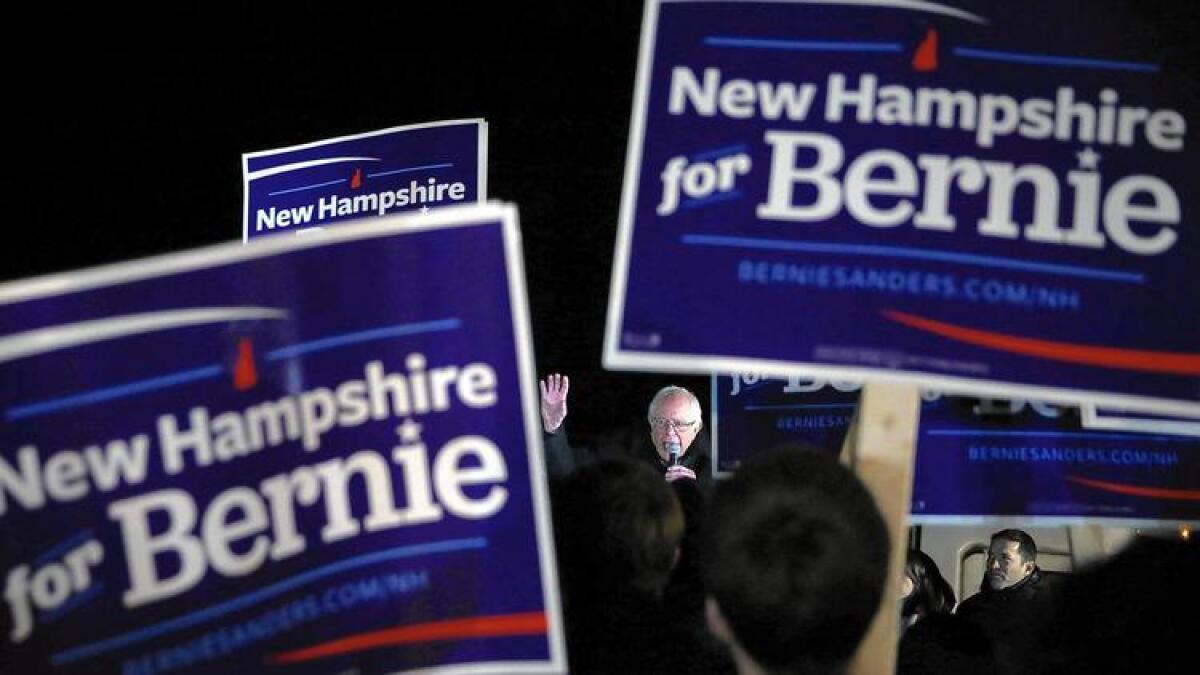
As Bernie Sanders rolled into New Hampshire on Tuesday, he found himself playing a role that is new to his campaign: that of the juggernaut.
The opportunity to take up the part may be fleeting for Sanders, the democratic socialist, independent senator from Vermont and Hillary Clinton’s rival for the Democratic presidential nomination. Once he moves past New Hampshire, the primary race gets a lot more complicated for him. But for now, he seems to be delighting in the worries of the Clinton campaign — wounded after a closer-than-expected win in Iowa’s caucuses Monday night — as he shores up support here, where most polls show him leading, some quite comfortably.
Sanders is holding the cards in the race this week, and he is using them.